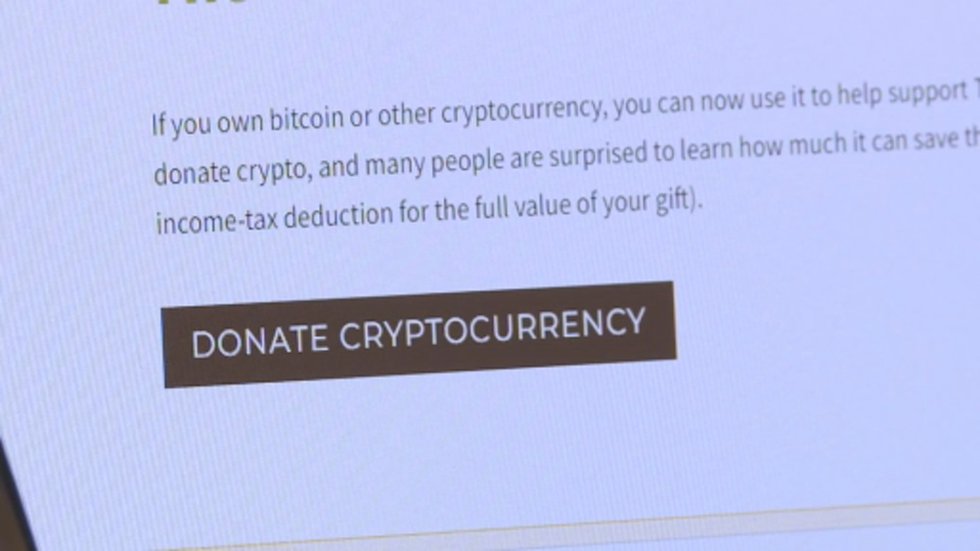MADISON, Wis. (WMTV) –
NOW ACCEPTING CRYPTOCURRENCY
At The River Food Pantry, monetary donations often come in the form of cash, credit, or check.
“We operate fully on donations,” said Director of Development Julie Wiedmeyer. “I think what we’re trying to do is make it as easy as possible to make a donation to The River and give people as many choices and avenues to make those donations.”
Earlier this year, the food pantry’s online giving platform expanded to accept cryptocurrency.
“We just wanted to get on the cutting edge,” explained Julie Wiedmeyer. “We wanted to be one of the first charities in this area to accept it.”
Unlike a government issued currency that uses dollars or coins, crypto is a completely digital asset. People can buy, sell, or trade them just like stocks or bonds. Those transactions are supported by
To better understand how cryptocurrency works, Wiedmeyer bought a small amount of Bitcoin. She says it was the best way for her to understand the market and the exchange.
“It’s just another tool, like the stock market or other investments that people are making,” said Wiedmeyer. “There’s risks with them and there’s rewards.”
Like cash donations, cryptocurrency donations to tax exempt non-profits are not subject to capital gains tax. Additionally, crypto donations are tax deductible. An investor could deduct the “fair market value” of your cryptocurrency donation, depending on how long you’ve held your cryptocurrency.
While there has not been a major interest in cryptocurrency donations to The River just yet, Wiedmeyer says it’s something other non-profits should consider looking into.
“It’s very early in the game and it’s not anything that needs to be rushed into right now,” said Wiedmeyer. “I hope in the next few years we’ll be seeing regular gifts coming in through cryptocurrency so I think it’s something to start getting educated on.”
CRYPTO FUNDRAISING EDUCATION
The Association for Fundraising Professionals Greater Madison Chapter is starting to educate some of its members about digital currency donations.
Jen Davie, the AFP Greater Madison Chapter Director says many members feel apprehensive about accepting gifts like this.
“It’s just nerve wracking to know that it’s not just dollars coming directly to us that we might have to do some sort of exchange of that to turn it into dollars that we’re able to use for our missions,” said Davie. “A lot of our fundraisers and staff teams don’t feel like they’re experts in accepting this.”
She says the biggest concern comes from an unfamiliarity with digital currency because of how new it is to many people.
“I know it’s been around a little bit longer than we would like to admit, but it’s becoming a form of currency that people are using,” said Davie. “Especially for a younger generation, they’re really kind of wanting to make their gifts in that capacity.”
Non-profit fundraising teams never want to be in a position to turn away a donation, both Wiedmeyer and Davie agree.
“When somebody comes and says, ‘I want to make a gift to you,’ our role as a fundraiser is to steward that and honor that choice that they’ve made,” Davie said. “Because really any donation to a mission in our community helps lift up everybody.”
“We want to make sure that we’re meeting people where they’re at and staying current with the new ways to donate,” added Wiedmeyer.
To help educate other fundraising teams, the Association of Fundraising Professionals Greater Madison chapter is hosting a webinar “Crypto for Good” on July 19 from noon to 1 p.m. To sign up or learn more about the course, click HERE.
CRYPTO CRASH
The cryptocurrency market has fallen drastically in recent months.
Brad Chandler, the Director of the Nicholas Center for Corporate Financing and Investment Banking, taught one of the first cryptocurrency classes at UW-Madison. He advises his students, and anyone looking to learn more about crypto, to understand the fluctuation of the market.
“These currencies tend to be very volatile,” said Chandler. “Bitcoin can go from all-time highs to lows that can really go down.”
Despite the current market, Chandler believes cryptocurrencies provide healthy economic competition when compared to other currencies.
“Even though I’m cautious about Bitcoin and its kind of ability to hold value in the future, I think it’s exciting that it’s created a lot of competition and that’s hopefully going to be beneficial to the average consumer,” said Chandler.
Chandler says there are a lot of people studying the market and working to learn more about digital assets.
“We’re seeing big banks having cryptocurrency teams putting out research on cryptocurrency and helping their clients get access,” he added. “It’s small right now, but if this is a sector that continues to have staying power, and if it gets bigger, you’ll see more of that in the future.”
Copyright 2022 WMTV. All rights reserved.
Author
Administraroot


